What the banking crisis means for mortgage rates
From CNN's Anna Bahney
 Single family homes in a housing development in Aurora, Colorado, in October 2022. (Chet Strange/Bloomberg/Getty Images)
Single family homes in a housing development in Aurora, Colorado, in October 2022. (Chet Strange/Bloomberg/Getty Images)Mortgage rates have taken would-be buyers on a ride this year — and it's only March.
Generally, home buyers can anticipate mortgage rates to move down through the rest of this year as the banking crisis drags on, which could cool down inflation.
But there are bound to be some bumps along the way. Here's why rates have been bouncing around and where they could end up.
Inflation is still quite high, but it is slowing and analysts are anticipating a much slower economy over the next few quarters — which should further bring down inflation. This is good for mortgage borrowers, who can expect to see rates retreating through this year, said Mike Fratantoni, Mortgage Bankers Association senior vice president and chief economist.
“Homebuyers in 2023 have shown themselves to be quite sensitive to any changes in mortgage rates,” Fratantoni said.
The MBA forecasts that mortgage rates are likely to trend down over the course of this year, with the 30-year fixed rate falling to around 5.3% by the end of the year.
“The housing market was the first sector to slow as the result of tighter monetary policy and should be the first to benefit as policymakers slow — and ultimately stop — hiking rates,” said Fratantoni.
Why Deutsche Bank has Wall Street worried
From CNN's David Goldman
 Deutsche Bank headquarters on August 13, 2021 in Frankfurt am Main, western Germany. (Armando Babani/AFP/Getty Images)
Deutsche Bank headquarters on August 13, 2021 in Frankfurt am Main, western Germany. (Armando Babani/AFP/Getty Images)Another day, another problem to worry about in the banking crisis. The focus of Wall Street's concerns today: Deutsche Bank.
Germany's biggest bank has been a well-known problem child for years. Over the past decade, Deutsche Bank racked up billions of dollars in losses as it struggled to compete with larger Wall Street rivals and paid the price of a string of scandals. It has gone through several strategy changes, major restructurings and mass layoffs over the past five years.
The bank has since rebounded strongly under CEO Christian Sewing, and last month reported its highest pre-tax profit in 15 years.
Earlier this week it reassured investors that it had "near zero" exposure to riskier bonds issued by Credit Suisse that were wiped out under the terms of its emergency rescue by UBS on Sunday.
But as the banking crisis drags on, investors are growing hypersensitive to any perceived weaknesses. When the cost of buying insurance against the risk of Deutsche Bank defaulting soared, that was enough to trigger the latest panic selling.
Deutsche Bank's shares tumbled 13% in Germany, dragging broader markets lower.
UBS-Credit Suisse will be huge, and not risk-free
From CNN's Hanna Ziady
 The headquarters of UBS (left) and Credit Suisse (center) are just yards apart in Zurich, Switzerland. (Michael Buholzer/Keystone/AP)
The headquarters of UBS (left) and Credit Suisse (center) are just yards apart in Zurich, Switzerland. (Michael Buholzer/Keystone/AP)The last-minute rescue of Credit Suisse on Sunday may have prevented the banking crisis from exploding, but it's a raw deal for Switzerland, and isn't risk free.
The tie-up with its larger rival, UBS, offered the best chance of restoring stability in the banking sector, and protecting the Swiss economy in the near term.
But it leaves Switzerland exposed to a single massive financial institution, even as there is still huge uncertainty over how successful the mega merger will prove to be. Thousands of job losses are expected.
Taxpayers are on the hook for up to 9 billions Swiss francs ($9.8 billion) of future potential losses at UBS arising from certain Credit Suisse assets, provided those losses exceed 5 billion francs ($5.4 billion). The state has also explicitly guaranteed a 100 billion Swiss franc ($109 billion) loan UBS, should it need it.
Switzerland's Social Democratic party says the newly created "super-megabank" increases risks for the Swiss economy.
With a roughly 30% market share in Swiss banking, "we see too much concentration risk and market share control," JPMorgan analysts wrote in a note before the deal was done. They suggested that the combined entity would need to exit or IPO some businesses.
The problem with having one single large bank in a small economy is that if it faces a bank run or needs a bailout — which UBS did during the 2008 crisis — the government's financial firepower may be insufficient.
And at 333 billion francs ($363 billion), local deposits in the new entity equal 45% of GDP — an enormous amount even for a country with healthy public finances and low levels of debt.
UBS is in a much stronger financial position than it was in 2008 and it will be required to build up an even bigger financial buffer as a result of the deal.
"Having been chief financial officer [at Morgan Stanley] during the last global financial crisis, I'm well aware of the importance of a solid balance sheet. UBS will remain rock-solid," UBS chairman Colm Kelleher said Sunday.
In a call with analysts, CEO Ralph Hamers said UBS would try to remove 8 billion francs ($8.9 billion) of costs a year by 2027, 6 billion francs ($6.5 billion) from cutting jobs.
According to Andrew Kenningham of Capital Economics, the "track record of shotgun marriages in the banking sector is mixed."
"Some, such as the 1995 purchase of Barings by ING, have proved long-lasting. But others, including several during the global financial crisis, soon brought into question the viability of the acquiring bank, while others have proven very difficult to implement."
Americans are going all-in on cash. That could spell more trouble
From CNN's Nicole Goodkind
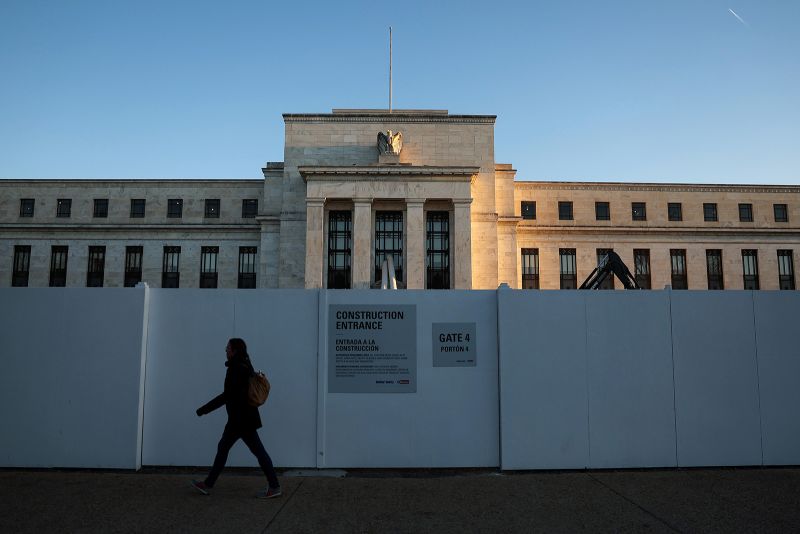 A pedestrian walks past the Federal Reserve Headquarters on March 21, 2023, in Washington, DC. (Kevin Dietsch/Getty Images)
A pedestrian walks past the Federal Reserve Headquarters on March 21, 2023, in Washington, DC. (Kevin Dietsch/Getty Images)In the wake of Silicon Valley Bank's collapse and subsequent banking meltdown, cash is king. The turmoil inflicted on financial markets has sent cautious investors running away from volatile markets and toward more liquid alternatives.
Money market funds, widely thought to be one of the safest, lowest-risk investment options, have seen an influx of cash in recent weeks as investors look for more stable ground.
These funds invest in short-term securities like government bonds, certificates of deposit — or fixed-term savings accounts — and commercial debt. The goal of a money market fund is to provide investors with a relatively stable investment option that offers higher returns than traditional savings.
But money markets aren't without risks of their own, especially when they experience a large wave of investors all at once.
What's happening: Since the Fed began to raise interest rates a year ago, the amount of money in money market funds has increased by roughly $400 billion. The inflows totaled more than $120 billion alone last week, according to Apollo Global Management. That means a record $5 trillion is currently invested.
Not-so-safe haven: But the more money there is invested in these funds, the greater the risk that cash could also flow out quickly, creating a money-market liquidity crisis — where funds may not have enough cash on hand to meet those redemptions.
Money market funds are deeply interconnected with the wider financial system, and often face the same risks as banks.
They typically invest in securities with maturities of 90 days or less, meaning they are very sensitive to changes in interest rates. They also invest heavily in commercial debt — if there's a significant economic downturn the issuers could default on their obligations.
US stocks sink on more bank fears
From CNN's David Goldman
Stocks: US stock futures fell sharply as a new concern emerged in a bank sector already on edge. Dow futures were down 340 points, or 1%. S&P 500 futures fell 0.9%. Nasdaq Composite futures were 0.6% lower. European markets tumbled, and Asian markets were slightly lower.
Fear & Greed Index: 31 = Fear
Oil & gas: US oil prices were down 3.5% to $67 a barrel. Average US gas prices held steady at $3.44 a gallon.
European bank stocks sink as fear returns
From CNN's Anna Cooban
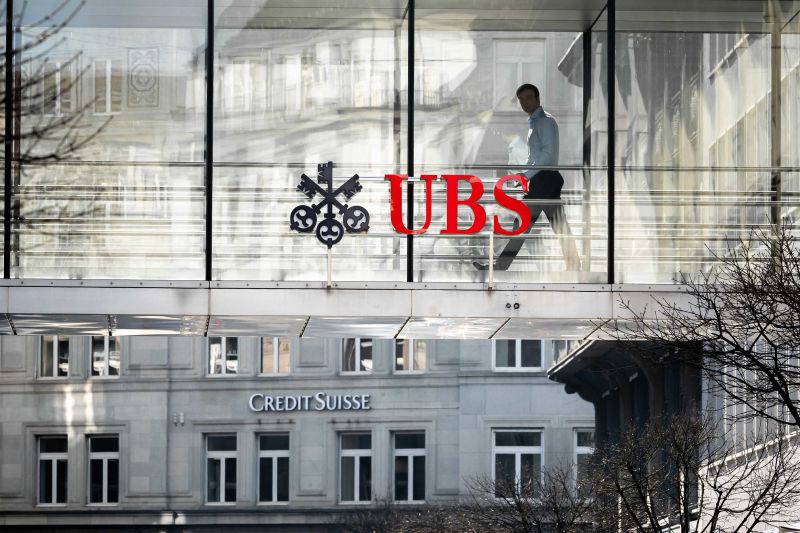 Swiss banks UBS and Credit Suisse are seen in Zurich, Switzerland, on March 20. (Fabrice Coffrini/AFP/Getty Images)
Swiss banks UBS and Credit Suisse are seen in Zurich, Switzerland, on March 20. (Fabrice Coffrini/AFP/Getty Images)Europe’s banking stocks tumbled Friday in a sign that investors are still nervous that the recent crises at some banks could spill over into the wider sector.
Europe’s Stoxx Europe 600 Banks index, which tracks 42 big EU and UK banks, fell 5% in morning trade. The index is down 19% from its high in late February. London’s bank-heavy FTSE 100 index dropped 2%.
Shares in Germany’s Deutsche Bank (DB) plunged 13.6%, while shares in UBS (ACPTX) and Credit Suisse (AMJL) slid 7% and 7.4% respectively Friday, following falls of 4.3% and 3.6% on Thursday.
The falls in UBS and Credit Suisse come after Bloomberg reported Thursday that the US Department of Justice (DOJ) was investigating whether their staff had helped Russian oligarchs evade Western sanctions.
The DOJ had sent subpoenas to those employees before UBS took over Credit Suisse, according to the report.
Employees at some major US banks are also part of the probe, Bloomberg said.
“Contagion fears are not yet going away — bank shares are lower again this morning and weighing on broader sentiment. Yesterday we witnessed Deutsche Bank credit default swaps blow out,” Neil Wilson, chief markets analyst at trading platform Markets.com, said in a note Friday.
Janet Yellen: Washington could protect deposits at bank of "any size" to prevent contagion
From CNN's Matt Egan
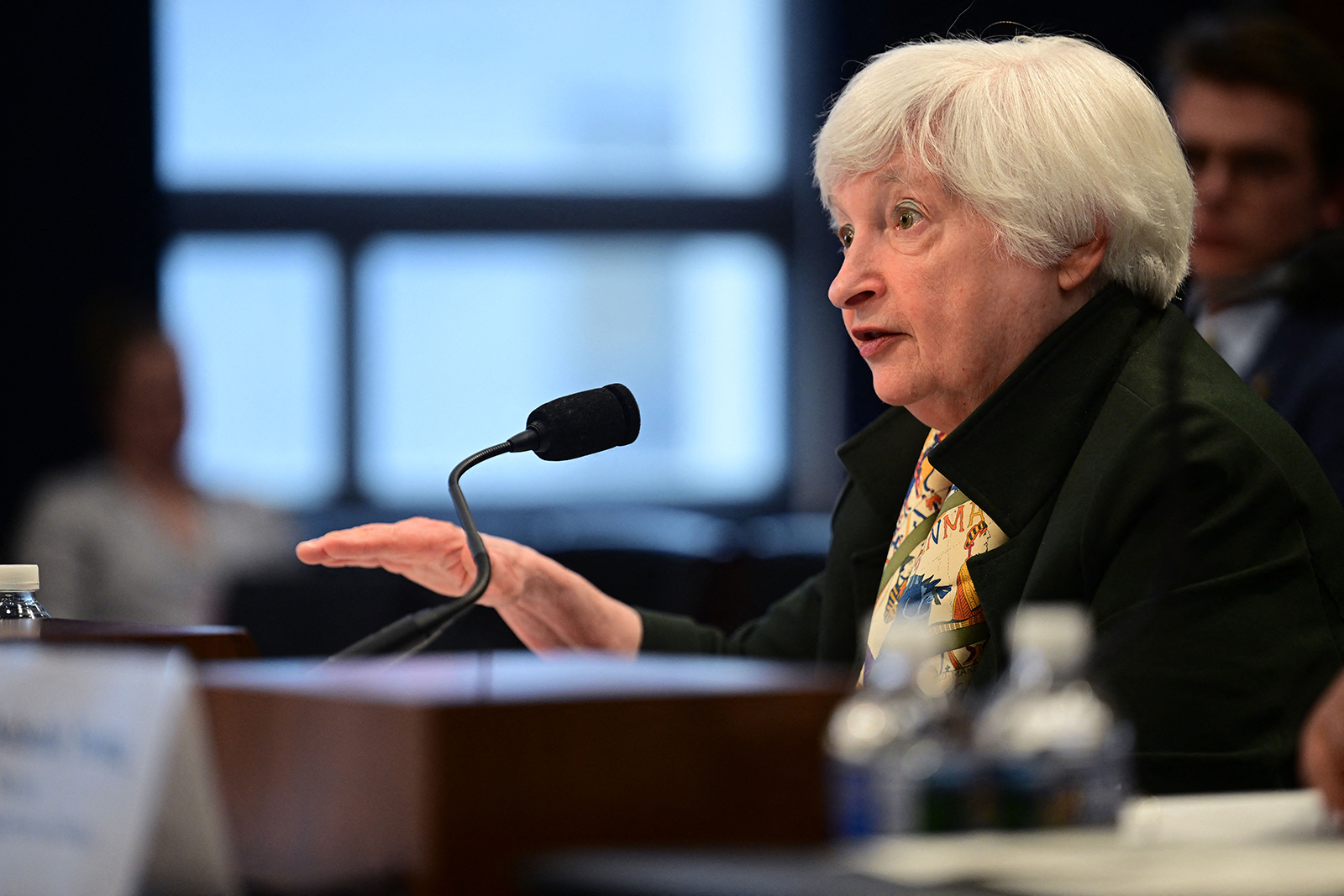 US Treasury Secretary Janet Yellen testifies at a House Appropriations Committee Financial Services and General Government Subcommittee hearing on "President Biden's FY2024 Budget Request and Economic Outlook," on Capitol Hill, March 23, in Washington, DC. (Jim Watson/AFP/Getty Images)
US Treasury Secretary Janet Yellen testifies at a House Appropriations Committee Financial Services and General Government Subcommittee hearing on "President Biden's FY2024 Budget Request and Economic Outlook," on Capitol Hill, March 23, in Washington, DC. (Jim Watson/AFP/Getty Images)In testimony before Congress Friday, Treasury Secretary Janet Yellen tried to calm markets about the government's efforts to prevent another bank run.
Yellen said the government used “important tools to act quickly to prevent contagion” and could use those tools again “for an institution of any size if we judged its failure would pose a systemic risk.”
This comes after Yellen seemed to spook markets late Wednesday by saying Treasury isn’t considering guaranteeing all bank deposits. That sent the Dow tumbling 500 points Wednesday. Markets recovered somewhat Thursday.
Banks continue to rely on the Fed for emergency funds
From CNN's Nicole Goodkind
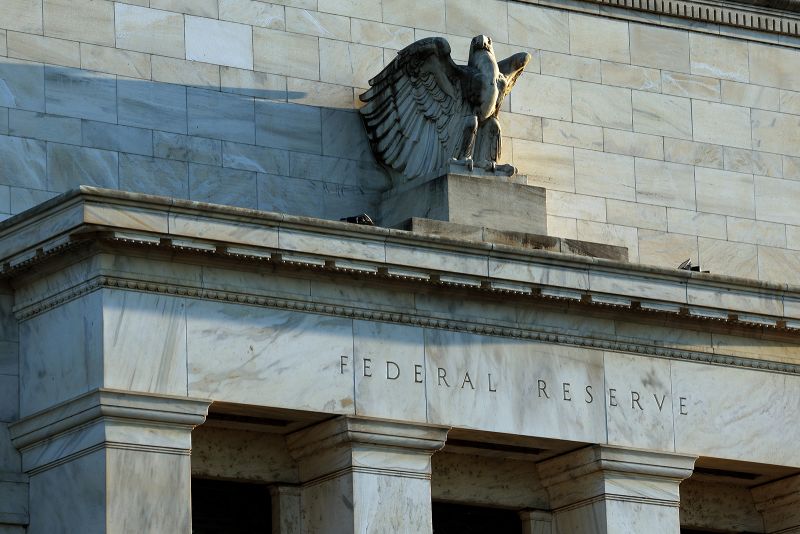 The Federal Reserve headquarters are pictured on March 21 in Washington, DC. (Kevin Dietsch/Getty Images)
The Federal Reserve headquarters are pictured on March 21 in Washington, DC. (Kevin Dietsch/Getty Images)Banks borrowed less this week from Federal Reserve emergency backstop funds than last, but not by much.
The Federal Reserve lent financial institutions a total of $163.9 billion in the week through March 22, compared with $164.8 billion last week, according to Fed data released Thursday.
Prior to the banking meltdown, those numbers had averaged in at around $10 billion a week.
But banks borrowed $53.7 billion — nearly five times more this week than last — under the Fed's newly launched Bank Term Funding Program. The Fed also reported lending to foreign central banks of $60 billion, up from zero on March 15.
The elevated numbers this week signal that turmoil is still working its way through the banking system. That turmoil has led some banks to look for quick access to cash to make customers whole or increase liquidity, which is what the central bank programs seek to provide.
.png)
 1 year ago
16
1 year ago
16


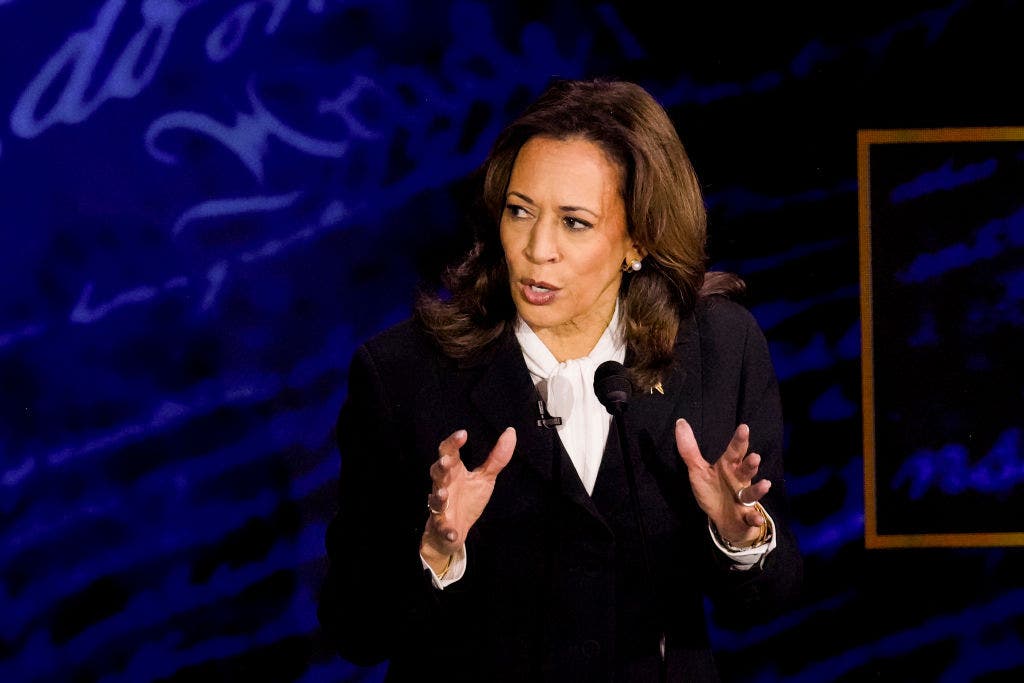






 English (US) ·
English (US) ·